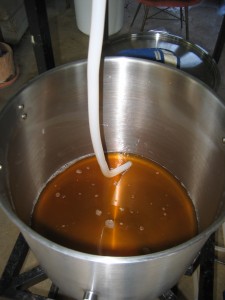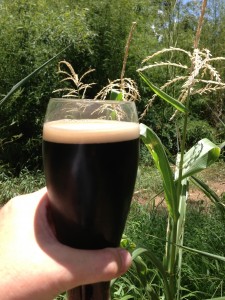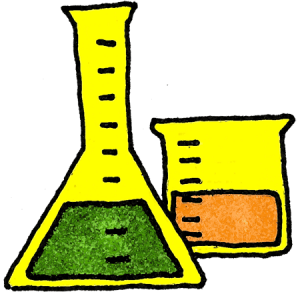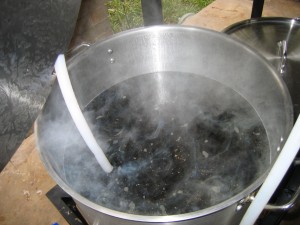Water chemistry is all the rage these days in homebrewing. John Palmer and Colin Kaminski just released an entire book on the subject — “Water” (2013, Brewers Publications). And many sources of homebrewing information, including this website, give advice on how to treat your water for brewing for different beers. Some homebrewers — especially those who are less familiar with chemistry or wish to keep their brewing hobby as simple as possible — may wonder how important water chemistry really is.
Archives for October 2013
Report Your IPA Experiment Results
If you brewed along with us and performed the IPA experiment, let us know your results today. (Or, you know, today-ish. Over the weekend is fine.) See the results form (at http://www.basicbrewing.com/experiment, or click the link) for communicating your results. We will compile them and report back here and also on an upcoming Basic Brewing Radio podcast.
Our Most Horrific Post Ever!
Some things are so foul that they should not be. For years, it’s mere existence proved that the universe is cold and merciless, indifferent to the pleas of good-hearted homebrewers everywhere. Eventually, its evil finally ran its course. But now — in this, our most horrifying post ever— we describe how to resurrect it, so it can walk the Earth again. [Cue thunder and lightning bolts.] If you doubt your courage, then read no further, for what you learn cannot be unlearned. What you release cannot be put back in the bottle.
How Much Wort Should Extract Brewers Boil?
Unlike all-grain brewers, extract brewers can boil almost any volume of wort they like — from volumes that are a fraction of the final batch volume to very large volumes. You can hypothetically dilute malt extract to almost any volume, boil it and still make beer. However, what is the best volume to boil for 5.0-gallon (19-L) batches?
Batch Sparge Volumes Table

A helpful chart for batch sparger volumes using the most common mash thickness and common pre-boil volumes.
Here is a table to help batch spargers plan their brewday. The table gives the amount of water required to mash in with a 1.25 qt./lb. (2.6 L/kg) mash thickness and how much sparge water would be required to rehydrate the grist to that thickness. It also gives the volumes of wort that would be collected with one or two additions of sparge water. Finally, it gives the volumes of additional water to add to collect either 6.0 gallons or 6.5 gallons of pre-boil wort when sparging once.
This chart allows batch spargers to look up how much water to heat during the brewday and lets them estimate how long of a boil time to plan for. All the numbers were generated on a spreadsheet. If you are a batch sparger, you can easily make your own spreadsheet that can be altered to account for different mash thickness, different target pre-boil wort volumes, the presence of dead spaces in your lauter tun or other variables.
The numbers in this chart are in English units. I’ll post the metric equivalent in the next few days.
How Much Wort Should Batch Spargers Collect?
With continuous sparging, there is an optimal volume of wort that can be collected from a given weight of malted grain. If a brewer collects less than this amount, he is leaving sugars behind in the grain bed. If he exceeds this amount, he will get more sugars, but at the expense of extracting excess tannins from the grain husks, which will make his beer astringent. On my system, this happens around 0.65 gallons of wort per pound of grain. The exact volume varies (although not by much) and this is something a serious continuously-sparging homebrewer should determine for himself on his own system. But what about batch spargers?
Bloody Brambles Weizen
Here’s an example of a fruit beer, to accompany my article on brewing with fruits. The base is a German wheat beer, and it is flavored with raspberries and blackberries. I’ve included the basic extract recipe, which utilizes a small partial mash to enhance the aroma of the beer. I also give options for all-grain and a stovetop BIAB version.
Bloody Brambles Berry Weizen
by Chris Colby
Extract (partial mash); English units
DESCRIPTION
A blood red wheat beer. The banana aroma (spiced with some clove) from the wheat beer yeast and berry aroma from the fruit blend nicely and you can taste both the fruit and the beer in this brew.
Our First XXX Post

Sean Lamb as the pool boy (left), Steve Moore as the pizza delivery guy (extra sausage) (right) and Cindy Chui as neither a pool boy nor a pizza deliverer. Sean and Steve were the announcers at the awards ceremony.
I’m trying to remember what I did last weekend, but I’m having trouble because I was under the influence of DST. What’s DST? DST stands for Dixie Cup Standard Time, the odd space-time anomaly that occurs every year in Houston at the conference of the Foam Rangers homebrewing club, the Dixie Cup. When DST is in effect, things like time and schedules lose all meaning. However, you don’t care because — to paraphrase their club motto — you’ve drank more barleywine before 9 am than most people drink all day. Plus, you’re hanging out with a bunch of homebrewers and having a great time.
This was the 30th annual Dixie Cup and hence the theme this year was Dixie Cup XXX. [Read more…]
What Should Your Pre-Boil Wort Volume Be?
How much wort should you have in your kettle or brewpot before the boil? The answer depends on whether you are an all-grain or extract brewer. In addition, among all-grain brewers, the amount of wort you should collect depends on which you value more, extract efficiency or the time and energy to boil away more wort. In this series of articles, I’ll discuss each option with regards to extract efficiency, brewer effort required and beer quality.
Porter: V (Specialty Porter II)
 This is the final installment of our series on porter. Earlier articles dealt with water treatment, dark grain profiles, ingredients and recipe advice, handling dark grains in the brewhouse and specialty porters.
This is the final installment of our series on porter. Earlier articles dealt with water treatment, dark grain profiles, ingredients and recipe advice, handling dark grains in the brewhouse and specialty porters.
There are a lot of variants of porter — smoked porter, vanilla porter, coffee porter, honey porter and porter fermented with lager yeast. These show up frequently at homebrew contests and are all available commercially. However, this doesn’t exhaust the types of specialty porter. Here are a few of the less common variants.







Recent Comments